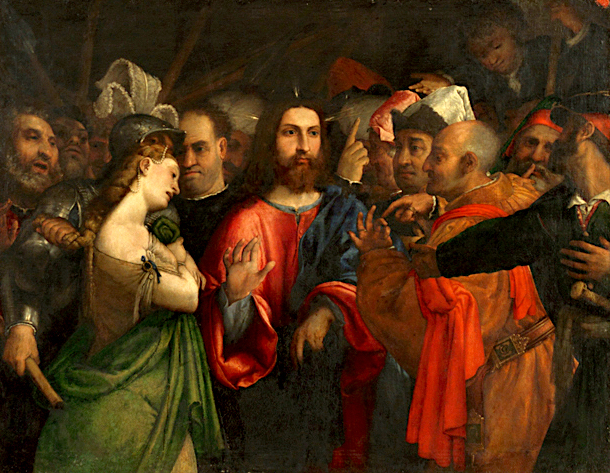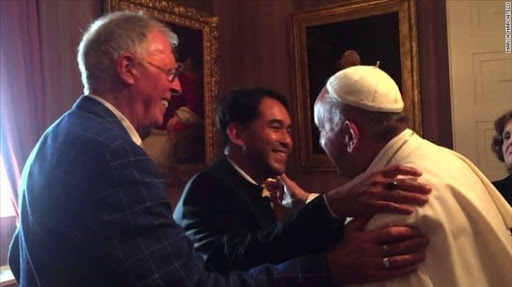
6590 words, 33 min read
At Roman noon today, Pope Francis published his latest apostolic exhortation, entitled Gaudete et Exsultate (“Rejoice and be glad”) in which he sets out “to repropose the call to holiness in a practical way for our own time, with all its risks, challenges and opportunities. For the Lord has chosen each one of us “to be holy and blameless before him in love” (Eph 1:4).” (§2). This 126K word document will take some time to receive and internalize well and I would, for now, just like to share with you my favorite passages from it. The holiness Pope Francis presents here is one that has its eyes wide open to the world and to God present in it. It is a holiness that asks for everything and that gives more in return. A holiness that requires sacrifice to the smallest details and that offers fulfilment and endless joy in a community where God dwells among his people.
I like to contemplate the holiness present in the patience of God’s people: in those parents who raise their children with immense love, in those men and women who work hard to support their families, in the sick, in elderly religious who never lose their smile. In their daily perseverance I see the holiness of the Church militant. Very often it is a holiness found in our next-door neighbours, those who, living in our midst, reflect God’s presence. We might call them “the middle class of holiness”. (§7)
Holiness is the most attractive face of the Church. But even outside the Catholic Church and in very different contexts, the Holy Spirit raises up “signs of his presence which help Christ’s followers” (Novo Millennio Ineunte). Saint John Paul II reminded us that “the witness to Christ borne even to the shedding of blood has become a common inheritance of Catholics, Orthodox, Anglicans and Protestants”. In the moving ecumenical commemoration held in the Colosseum during the Great Jubilee of the Year 2000, he stated that the martyrs are “a heritage which speaks more powerfully than all the causes of division”. (§9)
We should not grow discouraged before examples of holiness that appear unattainable. There are some testimonies that may prove helpful and inspiring, but that we are not meant to copy, for that could even lead us astray from the one specific path that the Lord has in mind for us. The important thing is that each believer discern his or her own path, that they bring out the very best of themselves, the most personal gifts that God has placed in their hearts (cf. 1 Cor 12:7), rather than hopelessly trying to imitate something not meant for them. We are all called to be witnesses, but there are many actual ways of bearing witness. (§11)
To be holy does not require being a bishop, a priest or a religious. We are frequently tempted to think that holiness is only for those who can withdraw from ordinary affairs to spend much time in prayer. That is not the case. We are all called to be holy by living our lives with love and by bearing witness in everything we do, wherever we find ourselves. Are you called to the consecrated life? Be holy by living out your commitment with joy. Are you married? Be holy by loving and caring for your husband or wife, as Christ does for the Church. Do you work for a living? Be holy by labouring with integrity and skill in the service of your brothers and sisters. Are you a parent or grandparent? Be holy by patiently teaching the little ones how to follow Jesus. Are you in a position of authority? Be holy by working for the common good and renouncing personal gain. (§14)
When you feel the temptation to dwell on your own weakness, raise your eyes to Christ crucified and say: “Lord, I am a poor sinner, but you can work the miracle of making me a little bit better”. In the Church, holy yet made up of sinners, you will find everything you need to grow towards holiness. The Lord has bestowed on the Church the gifts of scripture, the sacraments, holy places, living communities, the witness of the saints and a multifaceted beauty that proceeds from God’s love, “like a bride bedecked with jewels” (Is 61:10). (§15)
This holiness to which the Lord calls you will grow through small gestures. Here is an example: a woman goes shopping, she meets a neighbour and they begin to speak, and the gossip starts. But she says in her heart: “No, I will not speak badly of anyone”. This is a step forward in holiness. Later, at home, one of her children wants to talk to her about his hopes and dreams, and even though she is tired, she sits down and listens with patience and love. That is another sacrifice that brings holiness. Later she experiences some anxiety, but recalling the love of the Virgin Mary, she takes her rosary and prays with faith. Yet another path of holiness. Later still, she goes out onto the street, encounters a poor person and stops to say a kind word to him. One more step. (§16)
At times, life presents great challenges. Through them, the Lord calls us anew to a conversion that can make his grace more evident in our lives, “in order that we may share his holiness” (Heb 12:10). At other times, we need only find a more perfect way of doing what we are already doing: “There are inspirations that tend solely to perfect in an extraordinary way the ordinary things we do in life”. When Cardinal François-Xavier Nguyên van Thuân was imprisoned, he refused to waste time waiting for the day he would be set free. Instead, he chose “to live the present moment, filling it to the brim with love”. He decided: “I will seize the occasions that present themselves every day; I will accomplish ordinary actions in an extraordinary way”. (§17)
At its core, holiness is experiencing, in union with Christ, the mysteries of his life. It consists in uniting ourselves to the Lord’s death and resurrection in a unique and personal way, constantly dying and rising anew with him. But it can also entail reproducing in our own lives various aspects of Jesus’ earthly life: his hidden life, his life in community, his closeness to the outcast, his poverty and other ways in which he showed his self-sacrificing love. The contemplation of these mysteries, as Saint Ignatius of Loyola pointed out, leads us to incarnate them in our choices and attitudes. (§20)
The Father’s plan is Christ, and ourselves in him. In the end, it is Christ who loves in us, for “holiness is nothing other than charity lived to the full”. As a result, “the measure of our holiness stems from the stature that Christ achieves in us, to the extent that, by the power of the Holy Spirit, we model our whole life on his”. Every saint is a message which the Holy Spirit takes from the riches of Jesus Christ and gives to his people. (§21)
It is not healthy to love silence while fleeing interaction with others, to want peace and quiet while avoiding activity, to seek prayer while disdaining service. Everything can be accepted and integrated into our life in this world, and become a part of our path to holiness. We are called to be contemplatives even in the midst of action, and to grow in holiness by responsibly and generously carrying out our proper mission. (§26)
Needless to say, anything done out of anxiety, pride or the need to impress others will not lead to holiness. We are challenged to show our commitment in such a way that everything we do has evangelical meaning and identifies us all the more with Jesus Christ. We often speak, for example, of the spirituality of the catechist, the spirituality of the diocesan priesthood, the spirituality of work. For the same reason, in Evangelii Gaudium I concluded by speaking of a spirituality of mission, in Laudato Si’ of an ecological spirituality, and in Amoris Laetitia of a spirituality of family life. (§28)
This does not mean ignoring the need for moments of quiet, solitude and silence before God. Quite the contrary. The presence of constantly new gadgets, the excitement of travel and an endless array of consumer goods at times leave no room for God’s voice to be heard. We are overwhelmed by words, by superficial pleasures and by an increasing din, filled not by joy but rather by the discontent of those whose lives have lost meaning. How can we fail to realize the need to stop this rat race and to recover the personal space needed to carry on a heartfelt dialogue with God? Finding that space may prove painful but it is always fruitful. (§29)
We need a spirit of holiness capable of filling both our solitude and our service, our personal life and our evangelizing efforts, so that every moment can be an expression of self-sacrificing love in the Lord’s eyes. In this way, every minute of our lives can be a step along the path to growth in holiness. (§31)
Do not be afraid of holiness. It will take away none of your energy, vitality or joy. On the contrary, you will become what the Father had in mind when he created you, and you will be faithful to your deepest self. To depend on God sets us free from every form of enslavement and leads us to recognize our great dignity. We see this in Saint Josephine Bakhita: “Abducted and sold into slavery at the tender age of seven, she suffered much at the hands of cruel masters. But she came to understand the profound truth that God, and not man, is the true Master of every human being, of every human life. This experience became a source of great wisdom for this humble daughter of Africa”. (§32)
When somebody has an answer for every question, it is a sign that they are not on the right road. They may well be false prophets, who use religion for their own purposes, to promote their own psychological or intellectual theories. God infinitely transcends us; he is full of surprises. We are not the ones to determine when and how we will encounter him; the exact times and places of that encounter are not up to us. Someone who wants everything to be clear and sure presumes to control God’s transcendence. (§42)
It is not easy to grasp the truth that we have received from the Lord. And it is even more difficult to express it. So we cannot claim that our way of understanding this truth authorizes us to exercise a strict supervision over others’ lives. Here I would note that in the Church there legitimately coexist different ways of interpreting many aspects of doctrine and Christian life; in their variety, they “help to express more clearly the immense riches of God’s word”. It is true that “for those who long for a monolithic body of doctrine guarded by all and leaving no room for nuance, this might appear as undesirable and leading to confusion”. (§43)
Only on the basis of God’s gift, freely accepted and humbly received, can we cooperate by our own efforts in our progressive transformation. We must first belong to God, offering ourselves to him who was there first, and entrusting to him our abilities, our efforts, our struggle against evil and our creativity, so that his free gift may grow and develop within us: “I appeal to you, therefore, brethren, by the mercies of God, to present your bodies as a living sacrifice, holy and acceptable to God” (Rom 12:1). For that matter, the Church has always taught that charity alone makes growth in the life of grace possible, for “if I do not have love, I am nothing” (1 Cor 13:2). (§56)
Still, some Christians insist on taking another path, that of justification by their own efforts, the worship of the human will and their own abilities. The result is a self-centred and elitist complacency, bereft of true love. This finds expression in a variety of apparently unconnected ways of thinking and acting: an obsession with the law, an absorption with social and political advantages, a punctilious concern for the Church’s liturgy, doctrine and prestige, a vanity about the ability to manage practical matters, and an excessive concern with programmes of self-help and personal fulfilment. Some Christians spend their time and energy on these things, rather than letting themselves be led by the Spirit in the way of love, rather than being passionate about communicating the beauty and the joy of the Gospel and seeking out the lost among the immense crowds that thirst for Christ. (§57)
[A]mid the thicket of precepts and prescriptions, Jesus clears a way to seeing two faces, that of the Father and that of our brother. He does not give us two more formulas or two more commands. He gives us two faces, or better yet, one alone: the face of God reflected in so many other faces. For in every one of our brothers and sisters, especially the least, the most vulnerable, the defenceless and those in need, God’s very image is found. Indeed, with the scraps of this frail humanity, the Lord will shape his final work of art. For “what endures, what has value in life, what riches do not disappear? Surely these two: the Lord and our neighbour. These two riches do not disappear!” (§61)
The Beatitudes are like a Christian’s identity card. So if anyone asks: “What must one do to be a good Christian?”, the answer is clear. We have to do, each in our own way, what Jesus told us in the Sermon on the Mount. In the Beatitudes, we find a portrait of the Master, which we are called to reflect in our daily lives. (§63)
The word “happy” or “blessed” thus becomes a synonym for “holy”. It expresses the fact that those faithful to God and his word, by their self-giving, gain true happiness. (§64)
“Blessed are the poor in spirit, for theirs is the kingdom of heaven”
Wealth ensures nothing. Indeed, once we think we are rich, we can become so self-satisfied that we leave no room for God’s word, for the love of our brothers and sisters, or for the enjoyment of the most important things in life. In this way, we miss out on the greatest treasure of all. That is why Jesus calls blessed those who are poor in spirit, those who have a poor heart, for there the Lord can enter with his perennial newness. (§68)
This spiritual poverty is closely linked to what Saint Ignatius of Loyola calls “holy indifference”, which brings us to a radiant interior freedom: “We need to train ourselves to be indifferent in our attitude to all created things, in all that is permitted to our free will and not forbidden; so that on our part, we do not set our hearts on good health rather than bad, riches rather than poverty, honour rather than dishonour, a long life rather than a short one, and so in all the rest”. (§69)
“Blessed are the meek, for they will inherit the earth”
These are strong words in a world that from the beginning has been a place of conflict, disputes and enmity on all sides, where we constantly pigeonhole others on the basis of their ideas, their customs and even their way of speaking or dressing. Ultimately, it is the reign of pride and vanity, where each person thinks he or she has the right to dominate others. Nonetheless, impossible as it may seem, Jesus proposes a different way of doing things: the way of meekness. This is what we see him doing with his disciples. It is what we contemplate on his entrance to Jerusalem: “Behold, your king is coming to you, humble, and mounted on a donkey” (Mt 21:5; Zech 9:9). (§71)
Someone might object: “If I am that meek, they will think that I am an idiot, a fool or a weakling”. At times they may, but so be it. It is always better to be meek, for then our deepest desires will be fulfilled. The meek “shall inherit the earth”, for they will see God’s promises accomplished in their lives. In every situation, the meek put their hope in the Lord, and those who hope for him shall possess the land… and enjoy the fullness of peace (cf. Ps 37:9.11). For his part, the Lord trusts in them: “This is the one to whom I will look, to the humble and contrite in spirit, who trembles at my word” (Is 66:2). (§74)
“Blessed are those who mourn, for they will be comforted”
The world tells us exactly the opposite: entertainment, pleasure, diversion and escape make for the good life. The worldly person ignores problems of sickness or sorrow in the family or all around him; he averts his gaze. The world has no desire to mourn; it would rather disregard painful situations, cover them up or hide them. Much energy is expended on fleeing from situations of suffering in the belief that reality can be concealed. But the cross can never be absent. (§75)
A person who sees things as they truly are and sympathizes with pain and sorrow is capable of touching life’s depths and finding authentic happiness. He or she is consoled, not by the world but by Jesus. Such persons are unafraid to share in the suffering of others; they do not flee from painful situations. They discover the meaning of life by coming to the aid of those who suffer, understanding their anguish and bringing relief. They sense that the other is flesh of our flesh, and are not afraid to draw near, even to touch their wounds. They feel compassion for others in such a way that all distance vanishes. In this way they can embrace Saint Paul’s exhortation: “Weep with those who weep” (Rom 12:15). (§76)
“Blessed are those who hunger and thirst for righteousness, for they will be filled”
Hunger and thirst are intense experiences, since they involve basic needs and our instinct for survival. There are those who desire justice and yearn for righteousness with similar intensity. Jesus says that they will be satisfied, for sooner or later justice will come. We can cooperate to make that possible, even if we may not always see the fruit of our efforts. (§77)
True justice comes about in people’s lives when they themselves are just in their decisions; it is expressed in their pursuit of justice for the poor and the weak. While it is true that the word “justice” can be a synonym for faithfulness to God’s will in every aspect of our life, if we give the word too general a meaning, we forget that it is shown especially in justice towards those who are most vulnerable: “Seek justice, correct oppression; defend the fatherless, plead for the widow” (Is 1:17). (§79)
“Blessed are the merciful, for they will receive mercy”
Jesus does not say, “Blessed are those who plot revenge”. He calls “blessed” those who forgive and do so “seventy times seven” (Mt 18:22). We need to think of ourselves as an army of the forgiven. All of us have been looked upon with divine compassion. If we approach the Lord with sincerity and listen carefully, there may well be times when we hear his reproach: “Should not you have had mercy on your fellow servant, as I had mercy on you?” (Mt 18:33). (§82)
“Blessed are the pure in heart, for they will see God”
A heart that loves God and neighbour (cf. Mt 22:36-40), genuinely and not merely in words, is a pure heart; it can see God. In his hymn to charity, Saint Paul says that “now we see in a mirror, dimly” (1 Cor 13:12), but to the extent that truth and love prevail, we will then be able to see “face to face”. Jesus promises that those who are pure in heart “will see God”. (§86)
“Blessed are the peacemakers, for they will be called children of God”
It is not easy to “make” this evangelical peace, which excludes no one but embraces even those who are a bit odd, troublesome or difficult, demanding, different, beaten down by life or simply uninterested. It is hard work; it calls for great openness of mind and heart, since it is not about creating “a consensus on paper or a transient peace for a contented minority”, or a project “by a few for the few”. Nor can it attempt to ignore or disregard conflict; instead, it must “face conflict head on, resolve it and make it a link in the chain of a new process”. We need to be artisans of peace, for building peace is a craft that demands serenity, creativity, sensitivity and skill. (§89)
“Blessed are those who are persecuted for righteousness’ sake, for theirs is the kingdom of heaven”
Jesus himself warns us that the path he proposes goes against the flow, even making us challenge society by the way we live and, as a result, becoming a nuisance. He reminds us how many people have been, and still are, persecuted simply because they struggle for justice, because they take seriously their commitment to God and to others. Unless we wish to sink into an obscure mediocrity, let us not long for an easy life, for “whoever would save his life will lose it” (Mt 16:25). (§90)
Here we are speaking about inevitable persecution, not the kind of persecution we might bring upon ourselves by our mistreatment of others. The saints are not odd and aloof, unbearable because of their vanity, negativity and bitterness. The Apostles of Christ were not like that. The Book of Acts states repeatedly that they enjoyed favour “with all the people” (2:47; cf. 4:21.33; 5:13), even as some authorities harassed and persecuted them (cf. 4:1-3, 5:17-18). (§93)
In the twenty-fifth chapter of Matthew’s Gospel (vv. 31-46), Jesus expands on the Beatitude that calls the merciful blessed. If we seek the holiness pleasing to God’s eyes, this text offers us one clear criterion on which we will be judged. “I was hungry and you gave me food, I was thirsty and you gave me drink, I was a stranger and you welcomed me, I was naked and you clothed me, I was sick and you took care of me, I was in prison and you visited me” (vv. 35-36). (§95)
Given these uncompromising demands of Jesus, it is my duty to ask Christians to acknowledge and accept them in a spirit of genuine openness, sine glossa. In other words, without any “ifs or buts” that could lessen their force. Our Lord made it very clear that holiness cannot be understood or lived apart from these demands, for mercy is “the beating heart of the Gospel”. (§97)
If I encounter a person sleeping outdoors on a cold night, I can view him or her as an annoyance, an idler, an obstacle in my path, a troubling sight, a problem for politicians to sort out, or even a piece of refuse cluttering a public space. Or I can respond with faith and charity, and see in this person a human being with a dignity identical to my own, a creature infinitely loved by the Father, an image of God, a brother or sister redeemed by Jesus Christ. That is what it is to be a Christian! Can holiness somehow be understood apart from this lively recognition of the dignity of each human being? (§98)
[An] ideological error is found in those who find suspect the social engagement of others, seeing it as superficial, worldly, secular, materialist, communist or populist. Or they relativize it, as if there are other more important matters, or the only thing that counts is one particular ethical issue or cause that they themselves defend. Our defence of the innocent unborn, for example, needs to be clear, firm and passionate, for at stake is the dignity of a human life, which is always sacred and demands love for each person, regardless of his or her stage of development. Equally sacred, however, are the lives of the poor, those already born, the destitute, the abandoned and the underprivileged, the vulnerable infirm and elderly exposed to covert euthanasia, the victims of human trafficking, new forms of slavery, and every form of rejection. We cannot uphold an ideal of holiness that would ignore injustice in a world where some revel, spend with abandon and live only for the latest consumer goods, even as others look on from afar, living their entire lives in abject poverty. (§101)
We often hear it said that, with respect to relativism and the flaws of our present world, the situation of migrants, for example, is a lesser issue. Some Catholics consider it a secondary issue compared to the “grave” bioethical questions. That a politician looking for votes might say such a thing is understandable, but not a Christian, for whom the only proper attitude is to stand in the shoes of those brothers and sisters of ours who risk their lives to offer a future to their children. Can we not realize that this is exactly what Jesus demands of us, when he tells us that in welcoming the stranger we welcome him (cf. Mt 25:35)? (§102)
The saints do not waste energy complaining about the failings of others; they can hold their tongue before the faults of their brothers and sisters, and avoid the verbal violence that demeans and mistreats others. Saints hesitate to treat others harshly; they consider others better than themselves (cf. Phil 2:3). (§116)
It is not good when we look down on others like heartless judges, lording it over them and always trying to teach them lessons. That is itself a subtle form of violence. Saint John of the Cross proposed a different path: “Always prefer to be taught by all, rather than to desire teaching even the least of all”. And he added advice on how to keep the devil at bay: “Rejoice in the good of others as if it were your own, and desire that they be given precedence over you in all things; this you should do wholeheartedly. You will thereby overcome evil with good, banish the devil, and possess a happy heart. Try to practise this all the more with those who least attract you. Realize that if you do not train yourself in this way, you will not attain real charity or make any progress in it”. (§117)
If you are unable to suffer and offer up a few humiliations, you are not humble and you are not on the path to holiness. The holiness that God bestows on his Church comes through the humiliation of his Son. He is the way. Humiliation makes you resemble Jesus; it is an unavoidable aspect of the imitation of Christ. For “Christ suffered for you, leaving you an example, so that you might follow in his steps” (1 Pet 2:21). In turn, he reveals the humility of the Father, who condescends to journey with his people, enduring their infidelities and complaints (cf. Ex 34:6-9; Wis 11:23-12:2; Lk 6:36). (§118)
Here I am not speaking only about stark situations of martyrdom, but about the daily humiliations of those who keep silent to save their families, who prefer to praise others rather than boast about themselves, or who choose the less welcome tasks, at times even choosing to bear an injustice so as to offer it to the Lord. “If when you do right and suffer for it, you have God’s approval” (1 Pet 2:20). This does not mean walking around with eyes lowered, not saying a word and fleeing the company of others. At times, precisely because someone is free of selfishness, he or she can dare to disagree gently, to demand justice or to defend the weak before the powerful, even if it may harm his or her reputation. (§119)
Far from being timid, morose, acerbic or melancholy, or putting on a dreary face, the saints are joyful and full of good humour. Though completely realistic, they radiate a positive and hopeful spirit. The Christian life is “joy in the Holy Spirit” (Rom 14:17), for “the necessary result of the love of charity is joy; since every lover rejoices at being united to the beloved… the effect of charity is joy”. Having received the beautiful gift of God’s word, we embrace it “in much affliction, with joy inspired by the Holy Spirit” (1 Thess 1:6). If we allow the Lord to draw us out of our shell and change our lives, then we can do as Saint Paul tells us: “Rejoice in the Lord always; I say it again, rejoice!” (Phil 4:4). (§122)
Holiness is also parrhesía: it is boldness, an impulse to evangelize and to leave a mark in this world. To allow us to do this, Jesus himself comes and tells us once more, serenely yet firmly: “Do not be afraid” (Mk 6:50). “I am with you always, to the end of the world” (Mt 28:20). These words enable us to go forth and serve with the same courage that the Holy Spirit stirred up in the Apostles, impelling them to proclaim Jesus Christ. Boldness, enthusiasm, the freedom to speak out, apostolic fervour, all these are included in the word parrhesía. The Bible also uses this word to describe the freedom of a life open to God and to others (cf. Acts 4:29, 9:28, 28:31; 2 Cor 3:12; Eph 3:12; Heb 3:6, 10:19). (§129)
Look at Jesus. His deep compassion reached out to others. It did not make him hesitant, timid or self-conscious, as often happens with us. Quite the opposite. His compassion made him go out actively to preach and to send others on a mission of healing and liberation. Let us acknowledge our weakness, but allow Jesus to lay hold of it and send us too on mission. We are weak, yet we hold a treasure that can enlarge us and make those who receive it better and happier. Boldness and apostolic courage are an essential part of mission. (§131)
God is eternal newness. He impels us constantly to set out anew, to pass beyond what is familiar, to the fringes and beyond. He takes us to where humanity is most wounded, where men and women, beneath the appearance of a shallow conformity, continue to seek an answer to the question of life’s meaning. God is not afraid! He is fearless! He is always greater than our plans and schemes. Unafraid of the fringes, he himself became a fringe (cf. Phil 2:6-8; Jn 1:14). So if we dare to go to the fringes, we will find him there; indeed, he is already there. Jesus is already there, in the hearts of our brothers and sisters, in their wounded flesh, in their troubles and in their profound desolation. He is already there. (§135)
Let us not forget that Jesus asked his disciples to pay attention to details. The little detail that wine was running out at a party. The little detail that one sheep was missing. The little detail of noticing the widow who offered her two small coins. The little detail of having spare oil for the lamps, should the bridegroom delay. The little detail of asking the disciples how many loaves of bread they had. The little detail of having a fire burning and a fish cooking as he waited for the disciples at daybreak. (§144)
A community that cherishes the little details of love, whose members care for one another and create an open and evangelizing environment, is a place where the risen Lord is present, sanctifying it in accordance with the Father’s plan. There are times when, by a gift of the Lord’s love, we are granted, amid these little details, consoling experiences of God. (§145)
Finally, though it may seem obvious, we should remember that holiness consists in a habitual openness to the transcendent, expressed in prayer and adoration. The saints are distinguished by a spirit of prayer and a need for communion with God. They find an exclusive concern with this world to be narrow and stifling, and, amid their own concerns and commitments, they long for God, losing themselves in praise and contemplation of the Lord. I do not believe in holiness without prayer, even though that prayer need not be lengthy or involve intense emotions. (§147)
So let me ask you: Are there moments when you place yourself quietly in the Lord’s presence, when you calmly spend time with him, when you bask in his gaze? Do you let his fire inflame your heart? Unless you let him warm you more and more with his love and tenderness, you will not catch fire. How will you then be able to set the hearts of others on fire by your words and witness? If, gazing on the face of Christ, you feel unable to let yourself be healed and transformed, then enter into the Lord’s heart, into his wounds, for that is the abode of divine mercy. (§151)
I ask that we never regard prayerful silence as a form of escape and rejection of the world around us. (§152)
Meeting Jesus in the Scriptures leads us to the Eucharist, where the written word attains its greatest efficacy, for there the living Word is truly present. In the Eucharist, the one true God receives the greatest worship the world can give him, for it is Christ himself who is offered. When we receive him in Holy Communion, we renew our covenant with him and allow him to carry out ever more fully his work of transforming our lives. (§157)
We are not dealing merely with a battle against the world and a worldly mentality that would deceive us and leave us dull and mediocre, lacking in enthusiasm and joy. Nor can this battle be reduced to the struggle against our human weaknesses and proclivities (be they laziness, lust, envy, jealousy or any others). It is also a constant struggle against the devil, the prince of evil. Jesus himself celebrates our victories. He rejoiced when his disciples made progress in preaching the Gospel and overcoming the opposition of the evil one: “I saw Satan fall like lightning from heaven” (Lk 10:18). (§159)
[W]e should not think of the devil as a myth, a representation, a symbol, a figure of speech or an idea. This mistake would lead us to let down our guard, to grow careless and end up more vulnerable. The devil does not need to possess us. He poisons us with the venom of hatred, desolation, envy and vice. When we let down our guard, he takes advantage of it to destroy our lives, our families and our communities. “Like a roaring lion, he prowls around, looking for someone to devour” (1 Pet 5:8). (§161)
God’s word invites us clearly to “stand against the wiles of the devil” (Eph 6:11) and to “quench all the flaming darts of the evil one” (Eph 6:16). These expressions are not melodramatic, precisely because our path towards holiness is a constant battle. Those who do not realize this will be prey to failure or mediocrity. For this spiritual combat, we can count on the powerful weapons that the Lord has given us: faith-filled prayer, meditation on the word of God, the celebration of Mass, Eucharistic adoration, sacramental Reconciliation, works of charity, community life, missionary outreach. If we become careless, the false promises of evil will easily seduce us. (§162)
Discernment is necessary not only at extraordinary times, when we need to resolve grave problems and make crucial decisions. It is a means of spiritual combat for helping us to follow the Lord more faithfully. We need it at all times, to help us recognize God’s timetable, lest we fail to heed the promptings of his grace and disregard his invitation to grow. Often discernment is exercised in small and apparently irrelevant things, since greatness of spirit is manifested in simple everyday realities. It involves striving untrammelled for all that is great, better and more beautiful, while at the same time being concerned for the little things, for each day’s responsibilities and commitments. For this reason, I ask all Christians not to omit, in dialogue with the Lord, a sincere daily “examination of conscience”. Discernment also enables us to recognize the concrete means that the Lord provides in his mysterious and loving plan, to make us move beyond mere good intentions. (§169)
Only if we are prepared to listen, do we have the freedom to set aside our own partial or insufficient ideas, our usual habits and ways of seeing things. In this way, we become truly open to accepting a call that can shatter our security, but lead us to a better life. It is not enough that everything be calm and peaceful. God may be offering us something more, but in our comfortable inadvertence, we do not recognize it. (§172)
Naturally, this attitude of listening entails obedience to the Gospel as the ultimate standard, but also to the Magisterium that guards it, as we seek to find in the treasury of the Church whatever is most fruitful for the “today” of salvation. It is not a matter of applying rules or repeating what was done in the past, since the same solutions are not valid in all circumstances and what was useful in one context may not prove so in another. The discernment of spirits liberates us from rigidity, which has no place before the perennial “today” of the risen Lord. The Spirit alone can penetrate what is obscure and hidden in every situation, and grasp its every nuance, so that the newness of the Gospel can emerge in another light. (§173)
An essential condition for progress in discernment is a growing understanding of God’s patience and his timetable, which are never our own. God does not pour down fire upon those who are unfaithful (cf. Lk 9:54), or allow the zealous to uproot the tares growing among the wheat (cf. Mt 13:29). Generosity too is demanded, for “it is more blessed to give than to receive” (Acts 20:35). Discernment is not about discovering what more we can get out of this life, but about recognizing how we can better accomplish the mission entrusted to us at our baptism. This entails a readiness to make sacrifices, even to sacrificing everything. For happiness is a paradox. We experience it most when we accept the mysterious logic that is not of this world: “This is our logic”, says Saint Bonaventure, pointing to the cross. Once we enter into this dynamic, we will not let our consciences be numbed and we will open ourselves generously to discernment. (§174)
God asks everything of us, yet he also gives everything to us. He does not want to enter our lives to cripple or diminish them, but to bring them to fulfilment. Discernment, then, is not a solipsistic self-analysis or a form of egotistical introspection, but an authentic process of leaving ourselves behind in order to approach the mystery of God, who helps us to carry out the mission to which he has called us, for the good of our brothers and sisters. (§175)








